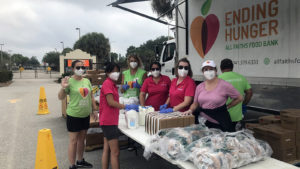Pandemic Heroes: How Food Banks are Responding to the COVID-19 Crisis
If coronavirus has taught us one thing, it’s that community and group efforts can come a long way. Food banks across the country are being challenged to scale up their services to support newly unemployed families and children that can no longer access free lunch programs at public schools. Many food banks are adapting to “the new normal” and highlight that the most vulnerable people in communities are in need of support more than ever. Food banks such as Feeding America, All Faith’s Food Bank, The Trussell Trust, Capital Area Food Bank, and many more have modified their operations in order to get the job done in a safe way.
Feeding America has recognized that over the last few months, the COVID-19 pandemic has changed how we interact, how we shop, how we work. When it comes to their food banks, Feeding America has launched the COVID-19 Response Fund, a national food- and fund-raising effort to support hunger and the food banks who help them. In addition, they are partnering with school districts and local government agencies to ensure that the 22 million children who rely on school meals have access to food while school is not in session.

Among the many other food banks working tirelessly to support hunger relief, All Faiths Food Bank recently received a grant of $150,000 from the COVID-19 Response Initiative of Gulf Coast Community Foundation and Charles & Margery Barancik Foundation. The Sarasota, FL-based food bank is the largest hunger relief organization and only food bank serving Sarasota and DeSoto counties. The Food Bank plans to use the funds provided to support and meet the increased needs of residential areas.
Due to school closings, kids are relying on food banks, such as All Faiths Food Bank, for their daily meals. As a result, they have accelerated their Campaign Against Summer Hunger and is already partnering with the Sarasota School District to help feed children at eight area schools. For sanitation purposes and social distancing requirements, the Food Bank is putting together pre-packed boxes of food, containing produce or meat, that can be distributed.
Due to the coronavirus pandemic, the Food Bank has made significant changes to their food distribution operations. The Food Bank normally accepts consumer food donations, but because of the alert that health officials placed to advise people to limit grocery shopping because of the contamination risks they are only accepting cash contributions. Also, they have shifted their usual food distribution to a drive-thru model in order to protect the health and safety of everyone involved. In addition, for social distancing purposes, the Food Bank has placed a temporary hold on group volunteering.
The quick adaptions that food banks across the country have been able to implement have helped maintain our national food systems, the health of families, and fostered resilience at a community level. They are one of the many heroes of this pandemic that are putting the needs of others before their own. All Faiths Food Bank has announced that in these times of need, every $1 donated has the power to purchase five meals for a resident. For more information or to donate, please visit www.allfaithsfoodbank.org.
Sources and Further Reading:
